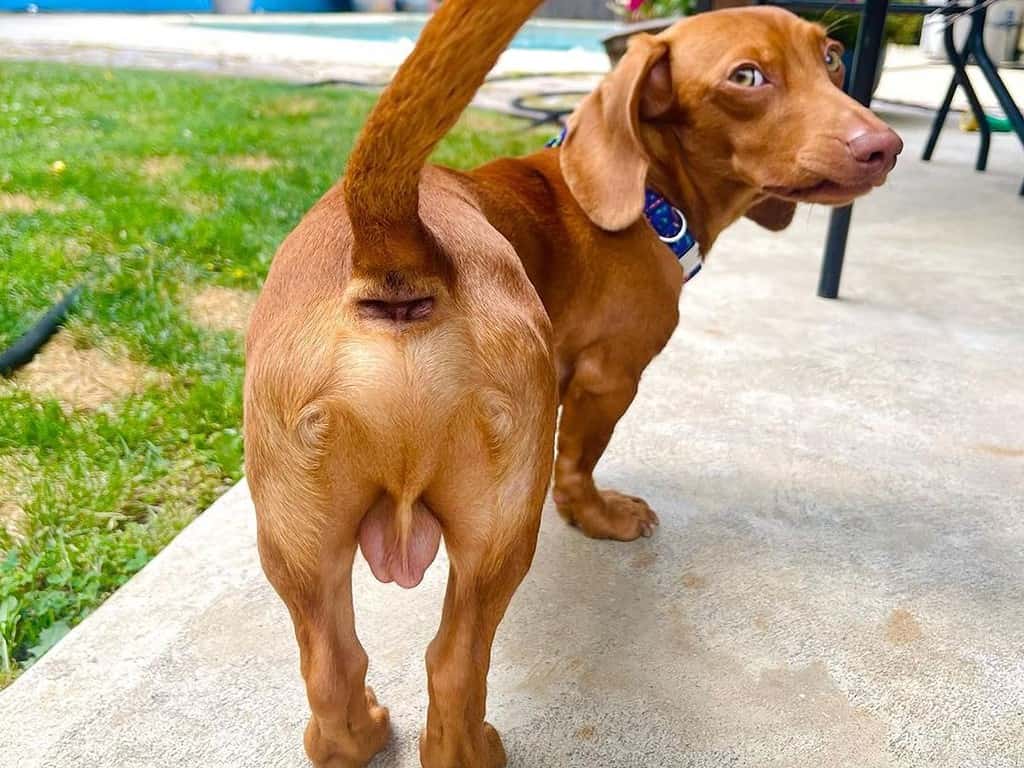You and your furry companion are peacefully situated on the couch when you suddenly hear this: Pfft. A smell like rotten eggs assaults every nook of the room.
Despite your attempts to air out the space, no amount of ventilation can rid the house of the stinky smell – coming from none other than your pup himself. You then ask yourself, “why does my dog’s farts smell like rotten eggs?”
Although this situation may seem funny, it is a serious matter for those dedicated to keeping their pups in optimal health. There are various factors that can contribute to this unpleasant phenomenon. We’ll discuss these reasons in detail, so be sure to read on.

Understanding Canine Digestion: How Dogs Digest Food
Dogs begin the digestion process in their oral cavity with the assistance of their sharp, pointed teeth for breaking down and grinding food. After the meals has been adequately chewed, it is expelled from the mouth into the esophagus as it makes its journey towards the stomach.
The stomach secretes digestive enzymes and acids such as pepsin which play a role in the breakdown of proteins. Moreover, acid produced in the stomach is able to restrict harmful microorganisms from remaining alive when ingested with food. Through contraction of its muscles, the gastric walls blend the food substances together with these digestive components resulting in a semi-liquid substance known as chyme.
The chyme expelled from the stomach processes further within the small intestine, where a multitude of nutrients are absorbed. This area houses villi-microscopic projections designed to bolster the surface area available for nutrient absorption. Additionally, enzymes secreted by the pancreas and bile released from the liver allow carbs, fats, and proteins to be broken into particles that can easily be absorbed into the bloodstream.
After ingestion, the resulting nutrients within the food are transferred to different organs and tissues around the animal’s body through its bloodstream, allowing both physical energy as well as appropriate sustenance. The remnants that weren’t broken down or taken up (such as fiber) reach the large intestine after digestion where a portion of water is absorbed and, and the remaining waste material is formed into dog poop.
Why Does My Dog’s Farts Smell Like Rotten Eggs or Sulfur?
Here are some of the reasons why your dog’s farts smell like rotten eggs or sulfur.
Diet
The consumption of certain foods may result in heightened gas in dogs, and this can often times explain an otherwise fishy odor. Experts have plain an otherwise pungent odor. Scientists have identified sulfur-containing compounds found in foods such as eggs, meat, dairy products, and some vegetables like broccoli and cabbage to be among the primary causes for the production of foul-smelling gas.
Consumption of foods containing sulfur-containing compounds in a dog’s diet results in the breakdown and subsequent release of intestinal hydrogen sulfide gas. This gas notoriously carries a scent evocative of sulfur or decaying eggs, and as dietary sulfur intake increases so does the concentration of the said compound, leading to more fishy odor.
Additionally, dietary decisions may have an effect on the odor of a dog’s flatulence. Dogss are known for scavenging things, such as spoiled food and garbage which can disturb their digestive system and result in increased natural gas production.
Food Allergies
When a dog with a distinct hypersensitivity ingests an ingredient to which they are sensitive, its digestive system may become irritated and inflamed. This imbalance in their digestion can hamper the normal breakdown and absorption of nutrients needed for metabolic processes, thus permitting undigested food particles to reach the large intestine. During this process, bacteria will ferment those substances yielding gaseous compounds like hydrogen sulfide. The said compound emits a potent smell similar to that of rotten eggs.
Dogs with food allergies can experience a range of gastrointestinal symptoms in addition to smelly farts, such as diarrhea, vomiting and abdominal discomfort or changes in appetite. It is important to recognise that not every dog will present the same signs of allergy, since this condition may present itself diversely across individuals.
Medical Issues: Health Conditions That Cause Foul-Smelling Farts
Dogs, like humans, can suffer from medical conditions which could cause their farts to have an offensive smell, resembling that of rotten eggs or sulfur.
Imbalance of Gut Bacteria
A common explanation for the foul odor emitted by a dog’s flatulence is gut bacteria imbalance. Microorganisms such as bacteria are vital for proper digestion and overall wellbeing in dogs, but when this equilibrium is disturbed it may result in an excessive growth of stench-producing microbes, like hydrogen sulfide.
Various elements can cause an imbalance of gut bacteria in dogs. One likelihood may be fluctuations or inconsistencies with diet, specifically the implementation of new edibles or rapid transition to alternative diets. An abrupt shift in nutrition habits can destabilize the fragile equilibrium of intestinal microorganisms, encouraging an excessive growth of gas-producing bacteria.
Additionally, certain medications, such as antibiotics, can cause a disruption of the delicate balance of beneficial bacteria in the gut which, when overwhelmed by gas-producing strains of bacteria, results in dog farts that smell like rotten eggs or sulfur.
The inadequate breakdown of food due to impaired digestion and malabsorption can also cause an imbalance in a dog’s gut bacteria. If the digestive system is not working properly, food components may be undigested and travel to the large intestine. This undigested material provides nourishment to specific kinds of bacteria which increases gas production and produces unpleasant odors.
Restoring equilibrium in the gut microbiome requires a multifaceted plan of action. Eating nutritiously and consistently is essential for keeping an optimal microbiome. Making gradual modifications in dietary intake, as well as taking prebiotics and probiotics, can facilitate the expansion of beneficial bacteria and amplify equilibrium in the system. Moreover, decreasing tension levels, providing consistent physical activity, and avoiding unnecessary antibiotic intake are also essential for preserving a healthy gut environment.
Exocrine Pancreatic Insufficiency (EPI)
Exocrine Pancreatic Insufficiency (EPI) is a disorder resulting in the pancreas’ detriment to create essential digestive enzymes. When this condition is present in dogs, their pancreatic glands fail to generate sufficient levels of amylase, lipase and protease for efficiently breaking down carbohydrates, fats and proteins necessary for proper digestion.
The correlation of EPI and a canine’s propensity to pass gas with the odor of rotten eggs or sulfur can be attributed to insufficient digestive enzyme levels. When enzymes are not present in sufficient quantities, food fails to be adequately broken down and enters the colon undigested. Bacteria within the colon ferment this matter, leading to production of gases including hydrogen sulfide. Hydrogen sulfide is particularly accountable for producing an odor similar to rotten eggs or sulfur.
In addition, EPI generally results in malabsorption of vital nutrients, resulting in the dog experiencing a decrease in weight, looser bowel movements, and an increase in appetite as the body attempts to make up for the deficiency of nutrient absorption. The unusable food particles that accumulate within the colon attract more bactera, worsening fermentation processing while also leading to smelly gas.

Intestinal Parasites
Canine intestinal parasites, such as roundworms, hookworms, or Giardia, can cause disruption to the digestive process of dogs. If infested with these parasites, a dog may produce gas that smell like rotten eggs.
In addition, the presence of intestinal parasites in a dog can cause gastrointestinal distress such as diarrhea. When food moves quickly through the digestive system due to diarrhea, digestion is incomplete which can result in increased gas production. Moreover, there may be increased amounts of sulfur compounds released into the atmosphere by these parasites, consequently leading to a foul odor from their farts.
Ways to Reduce or Eliminate Stinky Dog Farts
Dietary management is a viable solution to mitigate the unpleasant odors produced by canine flatulence. The quality and composition of food that a dog consumes has a major influence on its digestive system and thus, any gases created in response to digestion.
A high-quality dog food with easily digestible ingredients, such as those without excessive fillers or artificial additives, is essential for promoting optimal digestive health. To ensure successful adaptation to the new diet regimen, a transitional period should be observed and closely monitored for any signs of distress in the pup.
When it comes to the health of your dog, you must consider their dietary habits and digestion. It is recommended that instead of one large meal, meals are broken up into more frequent feedings to assist in smooth digestion and limit occurrences of increased gas discharge from the body. Slowing down meal time by utilizing puzzles or stimulating toys can further reduce air intake associated with inhalation while eating, which assists in preventing flatulence from forming.
It is also essential to ensure a dog’s regular exercise in order to promote physical and digestive health. Walks or playtime can help stimulate their gastrointestinal system, while also reducing stress which can assist with digestion-related issues such as smelly gas.
Alternative remedies may be an adequate solution for the problem. Probiotics, which contain beneficial microorganisms to promote good gastrointestinal health and aid in digestion, could be used as a therapeutic approach. Moreover, digestive enzymes can help break down food and minimize gas buildup. However, it is important to follow-up with a vet prior to incorporating any supplements so that they are safe and suitable for your pet’s individual needs.
Finally, it is important to eliminate any possible medical conditions that could be causing the persistent flatulence. Disorders such as Exocrine Pancreatic Insufficiency (EPI) and food allergies may be the root of odorous gas. If dietary changes and other interventions do not provide relief, it is recommended that a veterinarian be consulted in order to complete a full examination and run any necessary tests to determine if there are underlying health concerns contributing to this issue.
When Should I Worry About My Dog’s Sulfur-Like Farts?
It is important to closely monitor your pet’s overall health and behavior. If the fur baby is displaying no signs of sickness such as lethargy or weight loss, and has plenty of energy with a regular appetite, then the presence of sulfur-like farts may not be overly concerning. On the other hand, if any worrying changes in behavior are observed it is critical to get medical advice quickly to ascertain that there are no serious underlying issues.
When evaluating the causes of a dog’s sulfur-like farts, other accompanying symptoms should be taken into account. These may include diarrhea, vomiting, loss of appetite and changes in behavior. Individually the presence of any one symptom could stem from a variety issues such as dietary intolerances or allergies but together they can be indicative of more serious underlying conditions like Exocrine Pancreatic Insufficiency (EPI). It is therefore important to have prompt veterinary attention if multiple symptoms are observed in order to correctly identify and treat the problem.
Conclusion: Early Intervention Can Go a Long Way
It is to be expected for dogs to pass gas now and then; however, consistently strong-smelling sulfur-like flatulence should not be ignored. Monitoring the amount of flatulence, its strength, related symptoms and your pet’s general health can help you detect when it is necessary to consult a veterinarian for advice. Taking action sooner rather than later allows you to identify underlying digestive issues quickly, therefore ensuring the health and comfort of your beloved dog.
Related Questions
Are certain dog breeds more prone to having farts that smell like sulfur?
Brachycephalic breeds, such as Bulldogs and Pugs, are more susceptible to ingesting air while consuming food or beverages, leading to elevated levels of flatulence.
Additionally, Boxers are prone to conditions such as gastrointestinal disease like inflammatory bowel disease and intestinal parasites. These disorders may result in increased gas release and undesirable flatulence odors.
How does a dog’s diet contribute to the foul-smelling gas?
A dog’s nutrition can notably influence its digestive system and render it prone to excessive flatulence. Food items with high sulfurous components such as cabbage, broccoli, and certain proteins may notably boost the frequency of passing gas.
Can stress or anxiety contribute to foul-smelling flatulence in dogs?
When a dog experiences high stress levels, they secrete hormones, such as cortisol, which can disturb the processes of their body; one of which is digestion. This alteration to normal functioning within the gastrointestinal tract results in unstable movement and cause an excessive level of gas production; thus leading to smelly farts.




